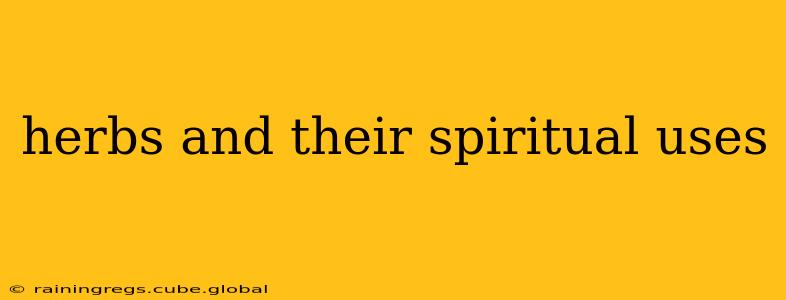For centuries, herbs have held a significant place in spiritual practices across diverse cultures. Beyond their culinary and medicinal properties, many herbs possess symbolic meanings and are believed to possess energetic qualities that can enhance spiritual journeys, rituals, and overall well-being. This exploration delves into the fascinating world of herbs and their spiritual uses, examining both ancient traditions and contemporary applications.
What are the most common herbs used in spiritual practices?
Several herbs consistently appear in spiritual practices worldwide, each carrying unique symbolic weight and purported energetic properties. Some of the most common include:
-
Sage: Known for its cleansing and purifying properties, sage is frequently used in smudging ceremonies to clear negative energy from spaces and individuals. Its earthy aroma is believed to promote grounding and connection to the earth.
-
Lavender: Often associated with tranquility, peace, and rest, lavender is used in meditation and relaxation practices to calm the mind and promote spiritual insight. Its soothing fragrance is believed to alleviate stress and anxiety.
-
Rosemary: Symbolic of remembrance and memory, rosemary is frequently used in rituals honoring ancestors or enhancing focus and concentration during spiritual practices. Its pungent aroma is believed to stimulate the mind and enhance clarity.
-
Chamomile: This gentle herb is widely associated with peace, healing, and calming. It's often used in teas or infusions to promote relaxation and spiritual connection before meditation or prayer.
-
Mugwort: Used for centuries in divination and dreamwork, mugwort is believed to enhance intuition and psychic abilities. Its strong aroma is said to open pathways to the subconscious mind.
-
Basil: Often linked to prosperity, love, and protection, basil is incorporated into rituals aimed at attracting abundance and fostering positive relationships. Its vibrant scent is seen as uplifting and energizing.
What are the spiritual benefits of using herbs?
The spiritual benefits attributed to herbs are multifaceted and often intertwined with their symbolic meanings and perceived energetic qualities. These purported benefits may include:
-
Cleansing and purification: Herbs like sage and cedar are frequently used to cleanse spaces and objects of negative energy, creating a sacred and pure environment conducive to spiritual practices.
-
Stress reduction and relaxation: Herbs such as lavender and chamomile are known for their calming effects, promoting relaxation and reducing stress, enabling deeper spiritual connection and introspection.
-
Enhanced intuition and psychic abilities: Herbs such as mugwort are believed to enhance intuition and open up pathways to spiritual insight and psychic abilities.
-
Protection and warding off negative energies: Some herbs, such as basil and rosemary, are used to protect against negative influences and create a safe space for spiritual work.
-
Connection to nature and the divine: Working with herbs connects individuals to the natural world, fostering a sense of reverence and appreciation for the earth's gifts and its spiritual power.
How are herbs used in different spiritual practices?
The ways herbs are employed in spiritual practices are as diverse as the traditions themselves. Common applications include:
-
Smudging: Burning bundles of herbs to cleanse spaces and individuals of negative energy.
-
Incense: Burning herbs to create fragrant atmospheres conducive to meditation, prayer, or ritual work.
-
Tea or infusions: Steeping herbs to create calming or energizing beverages for spiritual practices.
-
Anointing oils: Infusing herbs into carrier oils to create sacred oils for anointing oneself or objects.
-
Herbal baths: Adding herbs to bathwater to create a cleansing and spiritually uplifting experience.
Are there any precautions to take when using herbs for spiritual purposes?
While many herbs are generally safe, it's crucial to take some precautions:
-
Allergies: Be mindful of any potential allergic reactions before using herbs, especially if you have a history of allergies.
-
Pregnancy and breastfeeding: Consult a healthcare professional before using herbs during pregnancy or breastfeeding.
-
Interactions with medications: Some herbs may interact with medications, so it's important to consult a doctor or qualified herbalist if you are taking any medications.
-
Source your herbs responsibly: Choose high-quality, ethically sourced herbs whenever possible.
What are some examples of rituals using herbs?
Many cultures have specific rituals incorporating herbs. Examples include smudging ceremonies using white sage for cleansing, creating an altar with symbolic herbs representing intentions, or using specific herbal blends in offerings to deities. The rituals are varied and deeply personal.
This exploration provides only a glimpse into the vast world of herbs and their spiritual uses. The power of herbs lies not only in their tangible properties but also in the beliefs and intentions that accompany their use. By understanding their symbolism and harnessing their purported energetic qualities responsibly, we can deepen our connection to the spiritual realm and foster our own spiritual growth.
